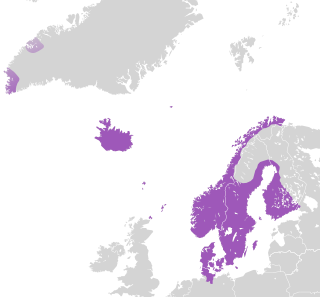
The Kalmar Union was a personal union in Scandinavia, agreed at Kalmar in Sweden as designed by Queen Margaret of Denmark. From 1397 to 1523, it joined under a single monarch the three kingdoms of Denmark, Sweden, and Norway, together with Norway's overseas colonies.
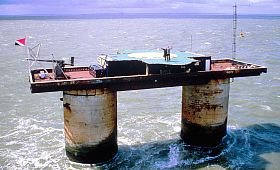
A micronation is a political entity whose representatives claim that they belong to an independent nation or sovereign state, but which lacks legal recognition by any sovereign state. Micronations are classified separately from de facto states and quasi-states; they are also not considered to be autonomous or self-governing as they lack the legal basis in international law for their existence. The activities of micronations are almost always trivial enough to be ignored rather than disputed by the established nations whose territory they claim—referred to in micronationalism as macronations. Several micronations have issued coins, flags, postage stamps, passports, medals and other state-related items, some as a source of revenue. Motivations for the creation of micronations include theoretical experimentation, political protest, artistic expression, personal entertainment and the conduct of criminal activity. The study of micronationalism is known as micropatriology or micropatrology.

The Principality of Sealand is a micronation on HM Fort Roughs, an offshore platform in the North Sea. It is situated on Rough Sands, a sandbar located approximately 11 kilometres (6 nmi) from the coast of Suffolk and 13 kilometres (7 nmi) from the coast of Essex. Roughs Tower is a Maunsell Sea Fort that was built by the British in international waters during World War II. Since 1967, the decommissioned Roughs Tower has been occupied and claimed as a sovereign state by the family and associates of Paddy Roy Bates. Bates seized Roughs Tower from a group of pirate radio broadcasters in 1967 with the intention of setting up his own station there. Bates and his associates have repelled incursions from vessels from rival pirate radio stations and the UK's Royal Navy using firearms and petrol bombs. In 1987, the United Kingdom extended its territorial waters to 12 nautical miles, which places the platform in British territory. As of August 2024, Sealand has only one permanent resident.
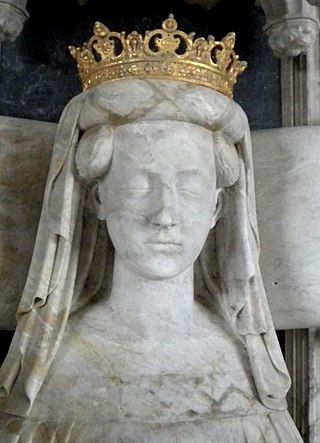
Margaret I was Queen regnant of Denmark, Norway, and Sweden from the late 1380s until her death, and the founder of the Kalmar Union that joined the Scandinavian kingdoms together for over a century. She had been queen consort of Norway from 1363 to 1380 and of Sweden from 1363 to 1364 by marriage to Haakon VI. Margaret was known as a wise, energetic and capable leader, who governed with "farsighted tact and caution," earning the nickname "Semiramis of the North". Also famous derisively as "King Breechless", one of several derogatory nicknames once thought to have been invented by her rival King Albert of Sweden, she was also known by her subjects as "Lady King", which became widely used in recognition of her capabilities. Knut Gjerset calls her "the first great ruling queen in European history."
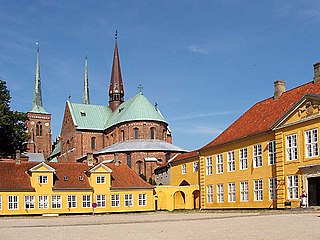
Roskilde is a city 30 km (19 mi) west of Copenhagen on the Danish island of Zealand. With a population of 52,974, the city is a business and educational centre for the region and the 10th largest city in Denmark. It is governed by the administrative council of Roskilde Municipality.

Christian I(Christiern I) was a German noble and Scandinavian monarch under the Kalmar Union. He was king of Denmark (1448–1481), Norway (1450–1481) and Sweden (1457–1464). From 1460 to 1481, he was also duke of Schleswig and count of Holstein. He was the first king of the House of Oldenburg.

The krone is the official currency of Denmark, Greenland, and the Faroe Islands, introduced on 1 January 1875. Both the ISO code "DKK" and currency sign "kr." are in common use; the former precedes the value, the latter in some contexts follows it. The currency is sometimes referred to as the Danish crown in English, since krone literally means crown. Krone coins have been minted in Denmark since the 17th century.

The Empire of Atlantium is a micronation and secular, pluralist progressive lobby group based in New South Wales, Australia.
Kugelmugel, officially the Republic of Kugelmugel, is a spherical art object located in Vienna, Austria.

The Gay and Lesbian Kingdom of the Coral Sea Islands was a putative micronation established as a symbolic political protest by a group of gay rights activists based in Australia. Declared in June 2004 in response to the introduction of a government bill to the Australian Parliament in May 2004 that codified the heterosexual definition of marriage, the Kingdom was founded on Australia's external overseas territory of the Coral Sea Islands, a group of uninhabited islets east of the Great Barrier Reef. The Kingdom was dissolved on 17 November 2017 following the "Yes" vote in the Australian Marriage Law Postal Survey legalising same-sex marriage.
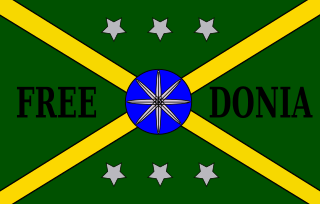
The Principality of Freedonia was a micronation based on libertarian principles. It was created as a "hypothetical project" by a group of teenagers in the United States in 1992. The project was formalized as a new country project in 1997, which included attempts in 2001 to lease territory in Somaliland. The attempt to lease land was rejected.
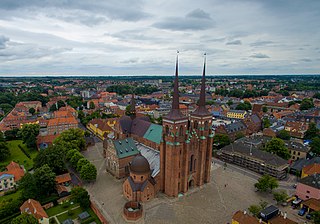
Roskilde Cathedral, in the city of Roskilde on the island of Zealand (Sjælland) in eastern Denmark, is a cathedral of the Lutheran Church of Denmark.
How To Start Your Own Country is a British six-part documentary comedy series aired between August and September 2005. The show was presented by British comedian Danny Wallace and followed his quest to start his own country in his flat in Bow, London. The micronation he created was eventually named "Kingdom of Lovely".

Molossia, officially the Republic of Molossia, is a micronation claiming de facto sovereignty over 11.3 acres of land near Dayton, Nevada. The micronation has not received recognition from any of the 193 member states of the United Nations. It was founded by Kevin Baugh in 1977. He continues to pay property taxes on the land to Storey County, the recognized local government, although he calls it "foreign aid". He has stated, "We all want to think we have our own country, but you know the United States is a lot bigger".
Talossa, also known as the Kingdom of Talossa, is one of the earliest micronations – founded in 1979 by then-14-year-old Robert Ben Madison of Milwaukee and at first confined to his bedroom; he adopted the name after discovering that the word means "inside the house" in Finnish. Among the first such projects still maintained, it has kept up a web presence since 1995. Its internet and media exposure since the late 1990s contributed to the appearance of other subsequent internet micronations.

Micronations are ephemeral, self-proclaimed entities that claim to be independent sovereign states, but which are not acknowledged as such by any recognised sovereign state, or by any supranational organisation. The constant reiteration of the flag as a symbol of a something that exists by the entity that it symbolizes confirms the validity of the flag as an officially sanctioned and/or definitive symbol of an entity; therefore, there has been a close association between vexillology/vexillogic imagination in creating visual symbols that appear to legitimize micronational claims.
The Kingdom of Vikesland was a micronation in Manitoba, Canada. It was founded in 2005 by Christopher Barry Joseph Beyette, a television news cameraman employed by the CHUM network.

Micronations: The Lonely Planet Guide to Home-Made Nations is an Australian gazetteer about micronations, published in September 2006 by Lonely Planet. It was written by John Ryan, George Dunford and Simon Sellars. Self-described as a humorous guidebook and written in a light-hearted tone, the book's profile of micronations offers information on their flags, leaders, currencies, maps and other facts. It was re-subtitled Guide to Self-Proclaimed Nations in later publications.
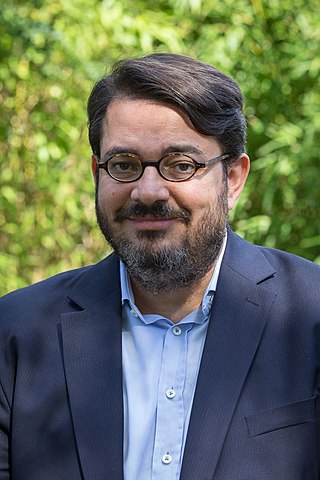
Although the academic study of micronations—known as micropatriology—is limited, there have nevertheless been a number of published works on the subject. The following is a list documenting these written works. This list does not contain works wherein micronationalism is the secondary theme, such as reference works which contain or make references to micronations and books about individual micronations.
















